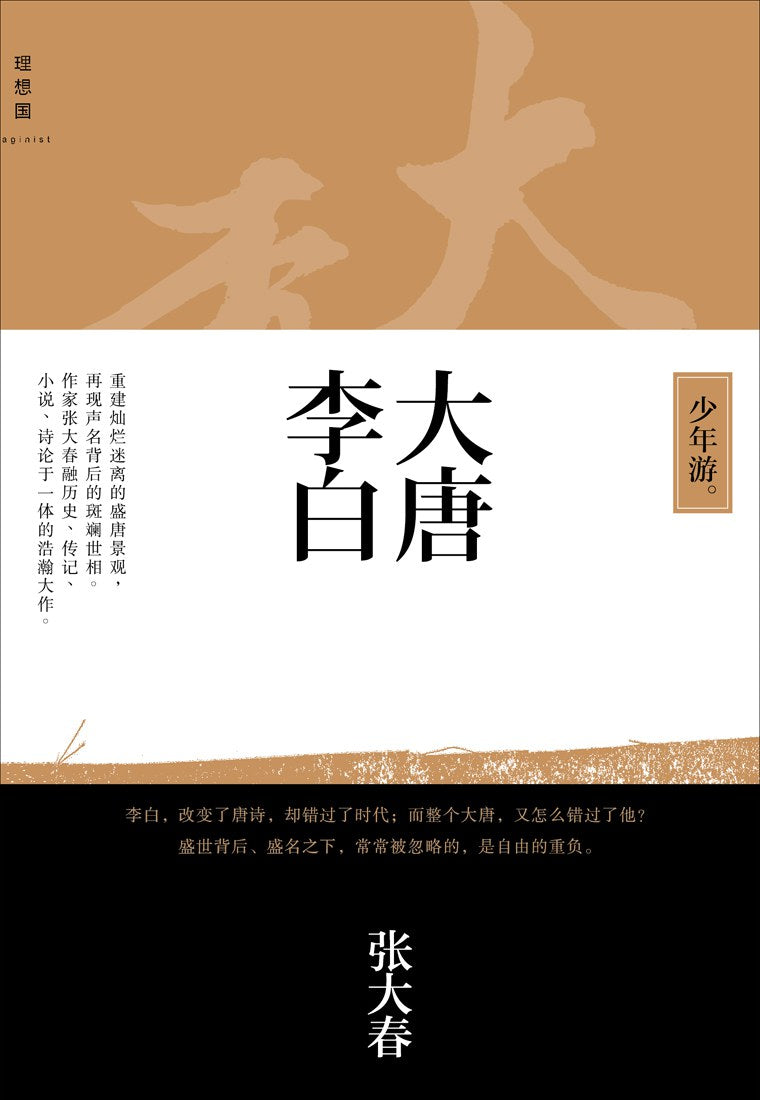Li Bai of the Tang Dynasty: A Young Wanderer
Li Bai of the Tang Dynasty: A Young Wanderer
[Taiwan] by Zhang Dachun
Low stock
Couldn't load pickup availability
About Book
About Book
Douban
NeoDB
A poet whose body is a star and whose voice is a fairy voice, but only his name remains; an era that claims to be prosperous but destroys poetry with vanity
Li Bai changed Tang poetry, but missed the era; and how could the entire Tang Dynasty miss him?
This is a masterpiece by Zhang Dachun that combines history, biography, fiction, and poetry. It was selected as one of the top ten books by Taiwan's China Times in 2013.
The Tang Dynasty was a time of great prosperity, both civil and military, embracing the world with unparalleled confidence and passion. Poetry, once the most free form of poetry, was imbued with the rules of meter and became a means to change destiny.
Why did the ethereal Li Bai, with his aspirations to "apply the teachings of Guan Yu and Yan Zhenqing, and devise the strategies of imperial rule," fail to qualify for the imperial examinations, even concealing his origins and wandering the world, destined to miss out on the prosperity of the world? Unable to conform to the rhythms of his time, his verses were arbitrary, so how could he have composed unrivaled verses that reached the ears of the gods, achieving the supreme glory of "Gao Lishi removing his boots, Yang Guifei pouring wine"? Even after achieving worldwide fame, why did he still lose sight of his original self, so that, millennia later, people still mostly remember only his name?
Behind the prosperity of the world, beneath the fame, often overlooked is the burden of freedom. The immortals that later generations admire, envy, and strive to reach are merely those excluded from the mundane world. As real life unfolds, the immortal realms of poetry gradually fade away, shaped by the various assumptions and restrictions of the times.
Li Bai changed Tang poetry, but missed the era; and how could the entire Tang Dynasty miss him?
The "Li Bai of the Tang Dynasty" series is a culmination of author Zhang Dachun's mastery of modern fiction and classical cultural heritage. Across millions of words, it recreates the life of the immortal poet Li Bai and the rise and fall of the Tang Dynasty. The first installment, "Youthful Travel," traces Li Bai's early travels, unravelling the mysteries of his origins and mentorship, and depicting the vibrant world of the heyday of the Tang Dynasty. The author weaves between fiction and history, not only using poetry to infer the inner and outer worlds of contemporary literati, but even boldly ghostwriting Li Bai, supplementing and rewriting his poems. The narrative is both elusive and captivating, a captivating and captivating interplay of rationality and intellectuality.
I think the reason why a novel like "Li Bai in the Tang Dynasty" is fascinating is not only because it uses a lot of "unconventional, wild, and unreliable history" to weave the stories around the legendary figure Li Bai, but also because it uses vague materials such as poetry to reversely infer the creative situation at that time, and tries to make that situation (of the times, society, and individuals) come alive again. This is undoubtedly a great challenge and satisfaction for a novelist.
Therefore, this book can be said to be a textual research, a poetic theory, a documentary, and of course a novel of a new form that is extremely challenging for readers.
—Wu Mingyi (novelist and professor at National Dong Hwa University in Taiwan)
"The great road is as vast as the blue sky, yet I alone cannot escape." The grandeur of the prosperous age reflects the poet's dilemma. Laughing up to the heavens, only to become a weed, Li Bai's sorrow is no less than Du Fu's. Rather than describing the grandeur of the prosperous age, it's better to describe its embarrassment, and Zhang Dachun captures this embarrassment with unwavering vigour.
——Liao Weitang (Hong Kong writer and poet)
Publication Date
Publication Date
Publisher
Publisher
Imprint
Imprint
Pages
Pages
ISBN
ISBN
share

